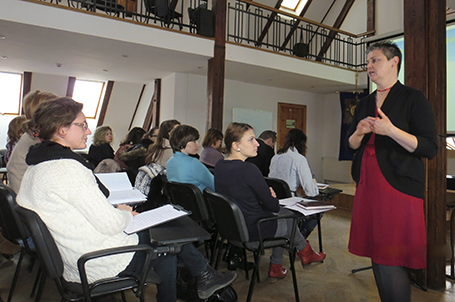Monday, Mar 31, 2014
Aided by the Fulbright Specialist Program, Dr. Chrystina Dolyniuk wants to raise autism awareness in the U.S. and abroad
by David J. Pavlak
Dr. Chrystina Dolyniuk wants to raise awareness of autism not only in the United States but abroad. An associate professor of psychology, she traveled to Ukraine twice courtesy of the Fulbright Specialist Program, most recently in March 2014. On April 15, Dolyniuk will present her work to the campus community as part of the Faculty Lecture Series.
Below is our Q-and-A with her about her most recent trip and experience.
Can you tell me a little bit about yourself?
I hold a doctorate in psychology and am trained as a specialist in autism and developmental disabilities. I also have a degree in special education and have worked with children with autism in various settings.
What about autism interested you to study it not only in the United States, but globally?
Autism spectrum disorder is a key concern everywhere right now. Fortunately, in the United States, children with autism receive a lot of services because there is a heightened level of awareness. Parents know about the characteristics of autism even before children are diagnosed. As a result, parents are looking for information and children at risk are likely to be screened and identified, if there is a problem.
Many other countries have not been doing as much research or providing early intervention. There are many countries that still don’t provide services to children with autism because training is limited, awareness is low, or they may not have well-developed services for children with disabilities. So the issue of global awareness and the need for services is a very important topic in my professional discipline right now.
We need to reach out to other countries and raise awareness, and provide intervention and training to professionals because they don’t necessarily know about autism or the information they have may be limited or outdated. The field is changing quickly and research is growing rapidly, but other countries don’t always have access to that information. In addition, there may be cultural or political barriers to accessing information, training or services. It’s important that all children receive services early in life because research shows that the sooner they receive intervention, the better their long-term outcome.
Why did you choose to study this topic in Ukraine?
I was actually invited twice to share my knowledge and this gave way to the opportunity to conduct research.
The people of Ukraine are striving for a true democracy but face tremendous challenges and the threat of Russian occupation. Ukraine is a nation that desperately needs our assistance and support right now. This is a country that historically hasn’t provided training for its professionals who work with children with autism. I was fortunate to do something meaningful at a critical time. As a specialist in autism, I know there is a big need for my skills in Ukraine. The fact that there is a shortage of autism specialists in Ukraine will continue to be true regardless of political conflicts or geographic battles. Since I am a Ukrainian-American and fluent in Ukrainian, I can help bridge some barriers at this crucial time.
Can you tell me about your research?
I am exploring the cultural and community needs of children with autism. My current project evolved out of my first Fulbright experience (July 2011) when I was invited by the Ukrainian Catholic University to conduct programmatic consultation and conduct guest lectures on autism. At that time, I got a good sense of what the needs were and started gathering information on various socio-cultural factors that might impact on service delivery. Over the last few years, I’ve continued to explore the challenges families and professionals who serve children with autism face at various levels.
For this second Fulbright experience (March 2014), I was specifically invited by the Ukrainian Catholic University’s Institute for Psychological Studies to raise awareness of autism in Ukraine. I was asked to conduct a five-day professional seminar, a three-day seminar for parents, and an open public lecture. This also gave me the opportunity to facilitate consultations and discussions with families and professionals and gather data on specific socio-cultural variables. I am conducting community-based research in the truest sense as I was in the field and experienced what the needs are for families first-hand at this very challenging time. So although the two projects are separate, my work is based on the need that I identified during my first trip and has been ongoing since that time. The objective is to conduct culturally-sensitive outreach to meet the growing and changing needs of children in Ukraine.

